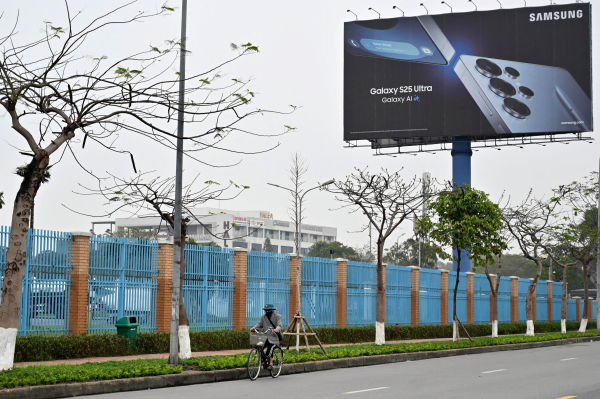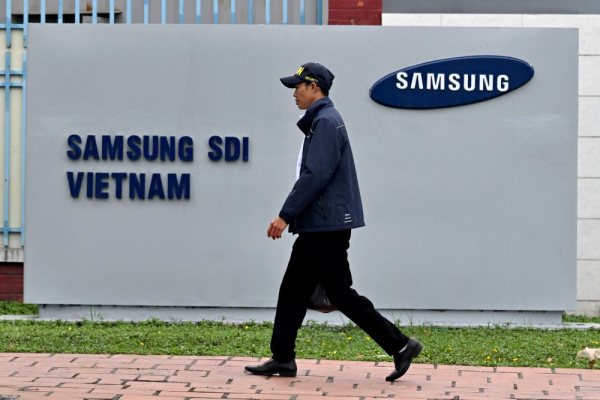KPL
Sipping tea on her break outside a Samsung Electronics factory in northern Vietnam, worker Nguyen Thi Mai said she had heard about US President Donald Trump's tariffs, but hoped it would not affect business.

This photo taken on April 8, 2025 shows a man cycling outside a Samsung factory in Bac Ninh province. Seeking low wages, R. Korean tech giant Samsung Electronics has built factories in Vietnam for years, with nearly half its high-end mobile phones now put together in the southeast Asian country. (Photo by Nhac NGUYEN / AFP)
(KPL/AFP) Sipping tea on her break outside a Samsung Electronics factory in northern Vietnam, worker Nguyen Thi Mai said she had heard about US President Donald Trump's tariffs, but hoped it would not affect business.
Samsung, the world's second-largest phone maker, produces around half of its handsets in Vietnam, and Trump's threat to impose a 46-percent tariff threat on the country sent shockwaves through the South Korean giant's supply chains.
"We don't understand much about macro issues," 27-year-old Mai told AFP, adding that daily life inside the factory in Bac Ninh province was unaffected, despite global market whiplash from on-again-off-again US levies.
"Our work goes on normally," agreed Le Van Binh, 30, adding that he hoped the Vietnamese government would be able to work out a deal.
"Our top leaders are arranging to negotiate with the United States. I hope they can be successful and things will be good for all of us."
Samsung turned to Vietnam because labour costs are "about one-tenth of those in the Republic of Korea", Kim Dae-jong, a professor at Sejong University, told AFP.
But US tariff threats -- even after Trump abruptly paused them on Wednesday -- are now shaking the logic that has underpinned decades of rapid growth and manufacturing investment in developing Asian economies, he said.
If Samsung "fully absorbs" the proposed tariff cost instead of shifting production elsewhere "approximately four trillion won ($2.7 billion) -- or some 33 percent of its smartphone operating profit -- would be directly exposed", said Kim Dong-won, managing director at KB Securities.
Samsung has built up inventory, and this week forecast record results for the first quarter of 2025. And there is scope for negotiations between Hanoi and Washington, he said -- but even so, it is concerning.
- 'Reallocating production' -
If Trump does follow through, Samsung and fellow Korean giant LG, which has also invested heavily in Vietnamese factories, may have no choice but to shift their investments to the United States, said Kang In-soo, an economics professor at Sookmyung Women's University.
"Despite the additional costs involved, this appears to be an inevitable decision to maintain or expand their presence in the strategically important US market," he said.
For Samsung, high-end televisions are their key driver of revenue stateside, Yong Seok-woo, president and head of the visual display business at Samsung Electronics told reporters.
"Most of the TVs sold in North America are produced in Mexico," said Yong, which dodged Trump's latest round of tariff threats -- potentially leaving Samsung in a better position than many rivals.
"We have 10 production sites worldwide," Yong added.
"We plan to overcome these challenges by reallocating production based on tariff conditions."
- Domestic base? -
The tariff threats appear to be aimed at securing additional foreign investment, but with the United States lacking a strong domestic base to produce the high-end chips that are the lifeblood of the global economy, many experts expect they will not last in the longer term.
Trump's decision to pause the imposition of the levies sparked euphoria on global markets on Thursday -- but he raised tariffs on China to 125 percent because of a "lack of respect".

This photo taken on April 8, 2025 shows a man walking past the logo of Samsung Electronics on a billboard in Bac Ninh province. Seeking low wages, R. Korean tech giant Samsung Electronics has built factories in Vietnam for years, with nearly half its high-end mobile phones now put together in the southeast Asian country. (Photo by Nhac NGUYEN / AFP)
Apple, Samsung's chief rival, produces the bulk of its iPhones in China.
Sky-high tariffs "could impose substantial costs on US-based semiconductor consumers", said Kang of Sookmyung Women's University, with the fear of price increases already sparking iPhone panic buying.
However, "it is expected that the tariffs will be adjusted downward once a sufficient level of investment is secured", Kang added.
Samsung's exposure underscores the broader vulnerability of export-driven Asian economies.
In 2024, net exports accounted for more than 90 percent of Korea's total economic growth.
The country has been particularly ill-prepared to face the economic headwinds, having been effectively leaderless since December, when impeached former president Yoon Suk Yeol declared martial law.
Officials are scrambling to contain the fallout: Acting leader Han Duck-soo spoke to Trump this week, with the trade minister also flying to Washington for emergency talks.
The government announced a battery of support measures for Korea's beleaguered car makers on Wednesday -- hit by sector-specific 25 percent tariffs -- but they need to do more to help the country's export-focused conglomerates, experts said.
Seoul must "focus on a proactive response to US tariff measures and swiftly implement a supplementary budget to stave off a deeper economic downturn", Kang said.
KPL